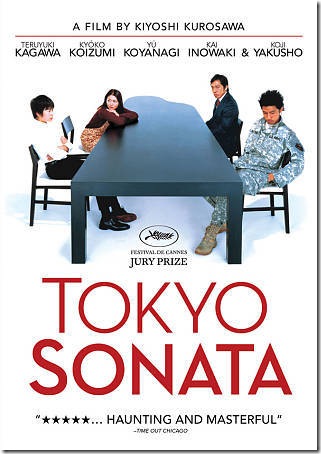Tokyo Sonata (E1)
Release date: May 4
Standard list price: $21.49
Tokyo Sonata, the latest from Japanese auteur Kiyoshi Kurosawa, is seemingly a departure from the director’s preferred forte of cerebral horror and science fiction. At least that’s how it begins, with a focus on the lives of a middle-class Japanese family of four that echoes Yasujiro Ozu’s gentle domestic dramas.
But it’s a film very much of the moment – Ozu’s preoccupations about the passage of time and how progress and maturation affect and dissolve the family unit are updated to reflect the economic recession of the 21st-century global job market through the character of husband and father Ryuhei (Teryuki Kagawa), who is downsized from his corporate position in the film’s opening.
A bureaucratic paper-pusher with few if any practical skills and a cringe-worthy lack of confidence in job interviews, Ryuhei is quickly absorbed among the throngs of unemployed drones. Full of shame, he keeps the news of his dismissal from his family, but his sins of omission are nothing compared to his neighbor, a long out-of-work man who dresses like a CEO and has programmed his cellphone to ring with supposed “business calls” every few minutes.
Ryuhei’s patriarchal leadership is slipping away, and with it generations of regressive Japanese tradition. He seems to have little control over his sons, one of whom (Inowaki Kai) pays for forbidden piano lessons with his lunch money while the other (Yu Koyanagi) leaves to fight for the United States in the war in Iraq. His anger and frustration at his diminished role inside and outside the family boil to the point where his wife Megumi (Kyoko Koizumi) barely recognizes his behavior.
There comes a point when you’re reminded that Tokyo Sonata is made by the the guy that gave us the modern paranormal classic Pulse (later repurposed as a flaccid Wes Craven slasher) and the mesmerizing serial-killer chiller Cure – and the movie never really settles down from there. This exceedingly dark transformation comes to a head when an inept robber (Koji Yakusho, one of Kurosawa’s most frequent collaborators) bungles an attempted job at Ryuhei’s house and instead steals away with a curiously compliant Megumi.
What seems at first like an awkward attempt to recast Yakusho as comic relief becomes the start of a journey that’s as strangely mystical as it is shockingly violent. This is a narrative punctuated by child abuse, rape and double suicides, and one main character is hit by a car and left for dead. But ultimately one leaves Tokyo Sonata with a sense of spiritual transcendence, a little bit of hope in a bleak and uncompromising world.
Movies this foundation-shaking and blazingly original don’t come across often; Kurosawa has been gifted enough to direct several, and Tokyo Sonata is somewhere near the top.
Oshima’s Outlaw Sixties (Criterion)
Release date: May 18
SLP: $61.49
This is the collection art-house cinemaniacs have been salivating for. Oshima’s Outlaw Sixties compiles five obscure early features from one of Japan’s most celebrated and controversial provocateurs, Nagisa Oshima. He’s most known in the west for his 1976 shocker In the Realm of the Senses, which depicted genital mutilation and unsimulated sex. Indeed, Oshima was one of the first Japanese directors to present uninhibited sexuality on the screen; Pleasures of the Flesh, included here, is one of many of his country’s “pink cinema,” or heavily edited soft-core porn titles, of the period. But he was also politically astute and cinematically audacious, his avant-garde sensibilities justifiably compared to Jean-Luc Godard’s (His Violence at Noon, included in this set, boasts more than 2,000 edits). The five-disc set also features Sing a Song of Sex, Japanese Summer: Double Suicide and Three Resurrected Bastards, censorship-baiting studies of youth culture that brewed together sex, violence and political invective, making Oshima an enfant terrible to be reckoned with.
Mine (Film Movement)
Release date: May 4
SLP: $22.49
One of the more underreported ripples from Hurricane Katrina’s devastating landfall has been the hundreds of thousands of pets abandoned in the storm’s wake. Geralyn Pezanoski’s documentary Mine follows the volunteer activists who led the rescue effort and the Katrina survivors looking to be reunited with their displaced animals, many of which have been relocated to families elsewhere. While it would seem the pets’ original owners should have the right to reclaim their animals, you can just as easily make the argument that the pets are better off frolicking in idyllic suburban neighborhoods or agrestic fields than potentially struggling in the blighted rubble of post-Katrina New Orleans. Narrowing its focus to four or five specific animals and their traumatic journeys from one loving family to the next and, sometimes, back again, Mine is sympathetic and understanding of all sides of this complex quagmire of moral, legal and practical considerations. If you’re a pet lover, prepare for your waterworks to be turned on full blast, either from sadness, joy or both. But you don’t need to love pets to appreciate filmed journalism as compelling as this. Mine is a story about love, kindness, greed, selfishness, community involvement and sacrifice – epic themes delivered in a tight 80-minute package.
One Deadly Summer (Bayview)
Release date: May 11
SLP: $27.99
This forgotten, Golden Palm-nominated 1983 noirish melodrama by Jean Becker aims to reach a new audience courtesy of Bayview Entertainment’s exceptional transfer. Isabelle Adjani stars as Eliane, the tartish femme fatale who seduces the affectionately named auto mechanic Pin-Pon (Alain Souchon) in order to unlock the secrets hidden in his family’s dusty barrel organ: Turns out the organ was delivered by the men who raped her mother and led to her conception – or so it seems. One Deadly Summer is full of interesting twists and surprises that help to compensate for some of its dated techniques, such as the shifting, unnecessary voice-over narration, which never achieves the Rashomon-like sense of conflicting perspectives and subjective realities that it’s shooting for. Adjani brings a compelling cocktail of fearlessness and vulnerability to her role, developing a tragic character that’s ultimately more memorable than the movie she’s in.



